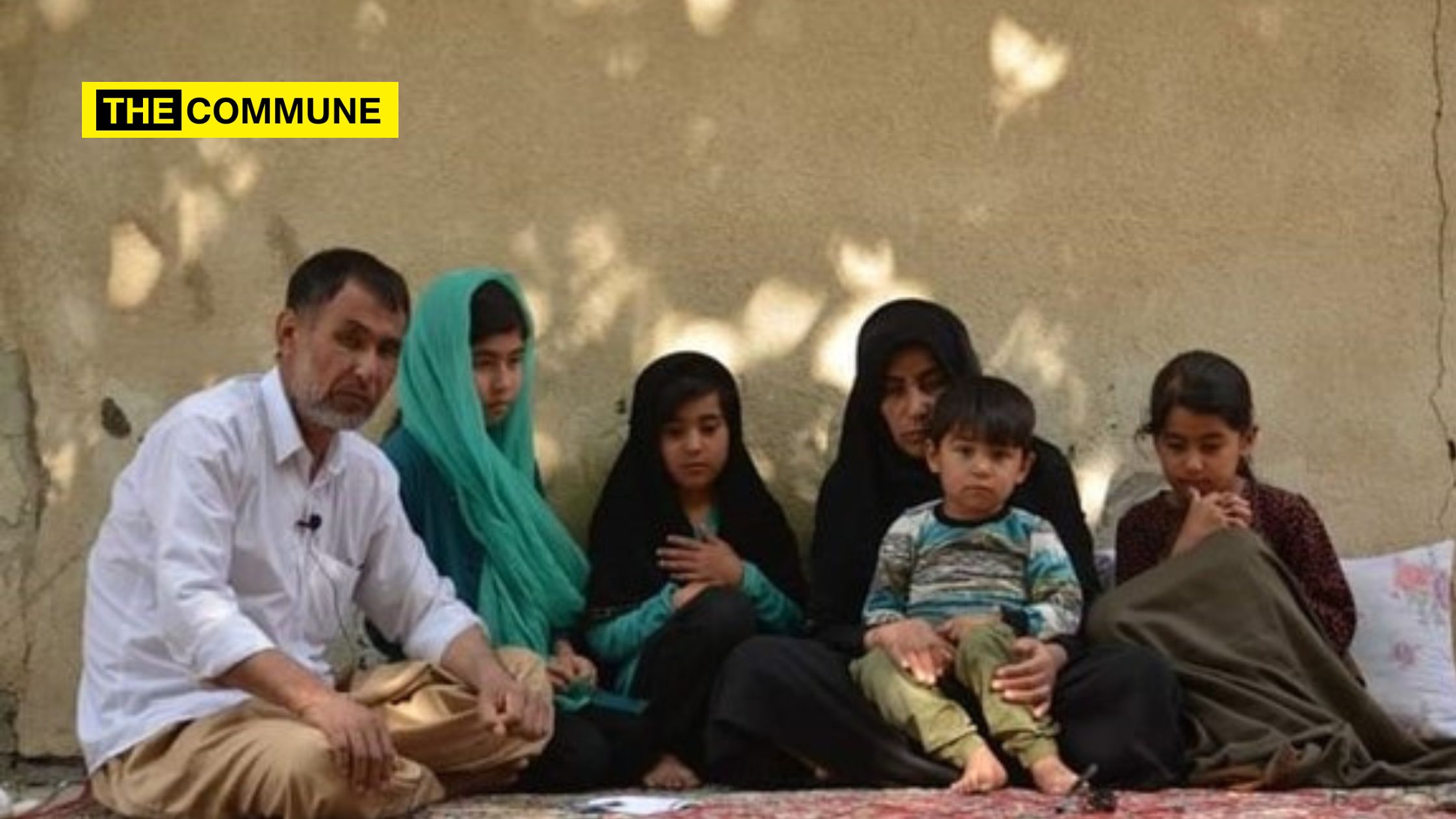
Rajab, Golandam and their Four Children; Courtesy: Independent Persian
This article is a continuation of a heart-rending story of an Afghan couple. Read Part One here.
Running Away From Home
After ten days of imprisonment and torture, Rajab and Golandam were transferred to Mazar-e-Sharif in the fifth and third PDS building and the Taliban’s Ministry of Interior in Kabul, where they were also tried and imprisoned in 2006. In 2006, Rajab and Golandam were arrested 25 days after fleeing from the village from a house in the Dasht-e-Barchi region of Kabul. The police of the then government of Afghanistan took them to Mazar-e-Sharif, where they were tried on the charge of “running away from home.” In the final verdict, the government court in Balkh sentenced Golandam to one year and Rajab to one and a half years in prison.
Arsala and Golandam’s brothers filed a complaint to the local court of Balkh province; they claimed that Golandam was kidnapped owing to Rajab’s threats and pressure. But Golandam said in response to the previous court that she eloped with Rajab of her own free will because her brothers threatened her with death, and the fact that she loved Rajab too.
Arsala claimed that Golandam was his wife when there was no marriage contract between them. Golandam said, “When my brothers made me betroth to Arsala without my consent, Arsala was in Iran. When the police arrested and imprisoned me and Rajab, Arsala came from Iran and brought false witnesses to the court to testify that I am his wife. In the court, I told the judges to put me next to five other girls and ask Arsala which one is your wife? If Arsala recognized me and said this one is Golandam, I will go with him. When I said that, Arsala ran away because he didn’t even recognize my face.”
Golandam and Rajab were imprisoned for running away from home. Still, the fate of Golandam after the prison term was not clear. She was faced with brothers who considered her running away with a Hazara man as a great disgrace and shame for all members of the tribe. Such an act in Afghanistan has often led to the death of women.

Abdul Hamid (pseudonym), a human rights activist who closely followed the case of Rajab and Golandam in 2006, said Arsala was mentally disturbed. He spoke contradictory and unclear in several meetings held in the Balkh court and the former governor’s office in the presence of Arsala, Rajab, Golandam, and her brothers. According to Abdul Hamid, the court’s investigations also proved the false claims of Arsala and Golandam’s brothers regarding the marriage of Arsala and Golandam.
Golandam said that her brothers and Arsala could not prove their claims in court. Therefore, her only crime was running away from home, which was not legally considered a crime. Even though running away from home was not defined as a crime in the laws of the previous Afghan government, hundreds of women were in jail for this charge. According to a Human Rights Watch report published in March 2012, Hassan Banu Ghazanfar, the Minister of Women’s Affairs of the then-Afghan government, had said: “The act of running away from home is not a crime, but if other crimes are committed under the name of running away from home, the courts will pursue those crimes.”
In most cases, women who ran away from home were tried after being arrested on charges of having sex outside of marriage. Human Rights Watch wrote: “Running away from home is not defined as a crime in Afghanistan’s criminal law.” By dominating Afghanistan, the Taliban abolished the constitution and other laws approved by the previous Afghan governments. They said this group follows the Quran and Sharia instead of man-made laws. Despite this description, Golandam and Rajab were tried and imprisoned in the court of the former government of Afghanistan on charges of running away from home. After Golandam’s prison term was over, she was transferred to a safe house for women and girls under threat because her brothers had threatened her with death.
From 2007 to 2011, Golandam was kept in a safe house in Mazar-e-Sharif. She went to the Balkh court in late 2011 and said that, on the one hand, she could not return home because her life was in danger, and on the other hand, she remained undecided in the safe house. She also learned that Arsala was married and had a child. Golandam asked the court to issue a ruling on her marriage with Rajab to save her from uncertainty in a safe house and death in her brothers’ house. According to the documents, the court approved the marriage between Golandam and Rajab, and their legal case was officially closed.
Golandam and Rajab’s wedding ceremony was held in a small gathering at Rajab’s sister’s house. None of Golandam’s family members attended her wedding. Golandam and Rajab could not return to their village in Dolatabad and continued to live in Mazar-e-Sharif and Kabul. Of course, Golandam’s brothers never gave up on them. But because the court declared their claim invalid, they could not do anything against Rajab and Golandam.
“The Previous Gov’s Court Was American”
After Rajab and Golandam were transferred from Kabul to Mazar-e-Sharif in late May 2022, Arsala and Golandam’s brothers once again approached the Taliban court with allegations against the couple. Rajab and Golandam were imprisoned in the Taliban prison in Mazar-e-Sharif. But their case was first referred to Dolatabad district. Golandam says everyone “from judge to the cook” are her brothers’ friends because most of the senior officials of the Taliban in Dolatabad district are from Dorman Afghania village and the Alizai tribe, the tribe to which Golandam and her family belong. For this reason, Golandam’s brothers have a lot of influence among the Taliban, and they used this influence against Rajab and Golandam.
Arsala and Golandam’s brothers submitted the documents to the security departments and the Taliban court after their arrest in Kabul. Many claims have been made, including that the American forces were involved in Golandam’s escape. Hussain Khan, Golandam’s brother, mentioned Rajab as “Commander Rajab” in one of his letters to the Taliban court. He wrote that in 2006, about six months after Golandam got engaged to Arsala, Rajab kidnapped her from their home’s way and took her to Kabul. In this letter, he adds: “After 25 days, Rajab and Golandam were arrested in Kabul, and after going through the court proceedings, the case ended in our favor, and Golandam was handed over to us.” But the American forces took her from us and carried her to a safe house.”
In this letter, Hossein Khan claimed he had twice planned to take Golandam from Mazar-e-Sharif to the village, but the American forces prevented this action. He also wrote that Rajab was supported by Mohammad Mohaqiq [one of the political leaders of the Hazaras] and Abbas Ibrahimzadeh, the former representative of the Balkh people in the House of Representatives and he was not able to confront Rajab.
A source who was present during the sessions of the Taliban court to deal with the case of Golandam and Rajab says that the Taliban judges were very emotional after hearing the words of Golandam’s brothers about the intervention of American forces in this case. One of the Taliban judges threatened Golandam that he would shoot her in the courtroom if he could. In his belief, Golandam is a woman from the Pashtun tribe, and she has destroyed the honor and dignity of this people.
Although all the details of Rajab and Golandam’s case have been available in the Balkh court since 2006, the Taliban judges insisted that the previous courts were American and their decisions have no credibility with the Taliban. In response to a question from the Taliban court about how he claimed to be married to Golandam, Arsala wrote: “Golandam lived with me for six months. I used to commute to their house freely.” In another letter, he writes: “During my affiance with Golandam, I didn’t have intercourse with her, but we got to flirt and commuted freely.” Elsewhere, in response to a question about whether he divorced Golandam after getting engaged, he writes: “I divorced Golandam in an official court. Of course, due to coercion and threats of death by unknown people.” During the captivity of Golandam and Rajab, in another letter to the Taliban’s fifth security district in Kabul, Arsala wrote: “Golandam is my wife.” I want to take her with me.”
Arsala’s letters and answers to the Taliban institutions are contradictory. The claims of Golandam’s brothers about the involvement of American forces and political leaders in supporting Rajab are not confirmed by any of the informed sources who have followed the case of Rajab and Golandam in courts of the previous government and the Taliban. Despite all this, the Taliban imprisoned Rajab and Golandam for nine months citing these claims as well as the religious difference between them.
The Cost Of Getting Released
During the nine months that Rajab was in the Taliban prison in Mazar-e-Sharif, he faced a repeated question in court hearings: “A Hazara follower of the Shia religion, how did you dare marry a Sunni Pashtun woman?” Taliban judges have repeatedly pointed out that the court of the former Afghan government, which issued the verdict on the marriage of Rajab and Golandam despite the difference in religion, was following American beliefs and laws; otherwise, such a verdict is not permissible. Rajab was told many times that the only way that might lead to his freedom is to divorce Golandam, and that’s enough. Rajab concluded that there was only one way to have Golandam and his children: to change his religion and convert to the Hanafi religion.
Therefore, Rajab requested some educational books about the Hanafi religion from his friends, who were the connector between him and his family. He read these books for several months in the Taliban prison. Then he announced to the Taliban court that he was now a follower of the Hanafi religion. Finally, the Taliban court promised freedom to Rajab and Golandam.
On the evening of Monday, 30 January 2023, Rajab and Golandam, who were imprisoned in two separate cells, heard the news of Khalifa Hossein’s death instead of being released. Rajab’s brother Hossein was the only one who followed up on the case of Rajab and Golandam. Golandam said about Hossein: “When we were transferred from Kabul to Mazar-e-Sharif and imprisoned there, Khalifa Hossein kept my three children with him and always visited and helped us. He used to come to the jail every Thursday and get news from us.”
Mrs. Golandam said without naming specific people: “They killed Khalifa Hussein because our innocence was proven in the court, and they couldn’t do anything with us.” Rajab said with great and profound sadness that his brother was killed: “I wish they didn’t kill my brother and… they would do whatever they wanted with us, but I wish they didn’t kill him. I lost everything, even my brother.”
Regarding how he was released from Taliban prison, Rajab says that in the last court session, the judge made sure that he had converted to the Hanafi religion or not and had no religious differences with Golandam. The Taliban judge asked him questions about the Sharia issues of the Hanafi religion and found the answers of Rajab, who had studied religious books during his several months in prison, convincing. While confirming the ruling of the court of the previous government regarding Rajab and Golandam’s marriage, the judge issued the sentence for their release.
Displaced In Iran
In late February 2023, Rajab and Golandam fled to Iran through smuggling after being released from Taliban prison. As a result of the electric shocks and torture he suffered during his captivity by the Taliban in Kabul, Rajab suffered from a nervous problem and developed diabetes during his nine months of imprisonment in Mazar-e-Sharif. His daughter, Nargis, was left under the hands and feet of passengers while running in a plain on the way to Iran illegally. Now, parts of her body, including her legs, are infected, and she is in severe pain. Golandam has also been suffering from high blood pressure in the Taliban prison, and now she gets sick occasionally.

Golandam said: “I love Rajab; both of us are satisfied with this marriage, although it ended up being very difficult for us. But in these years, we did not spend a single day in peace because of my brothers.” Golandam added that her children have nightmares at night and sometimes scream at midnight, saying, “Don’t imprison us. Don’t beat my father.” and wake up.
Endnotes:
- https://www.hrw.org/report/2012/03/28/i-had-run-away/imprisonment-women-and-girls-moral-crimes-afghanistan
- http://www.indiandefencereview.com/the-darkness-of-talibans-sharia/
- https://cdn.jwplayer.com/previews/q4kJMW5Z
This story was written by Mukhtar Vafaei and translated by Asadullah Jafari “Pezhman”.
Click here to subscribe to The Commune on Telegram and get the best stories of the day delivered to you personally.




